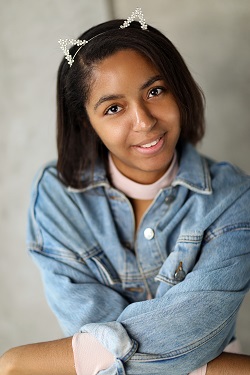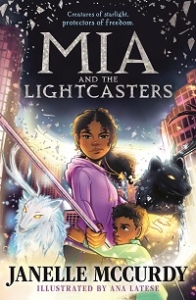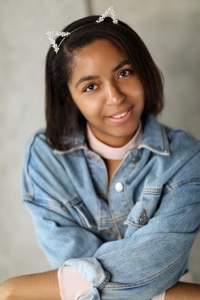
Ramping it up for the gaming aesthetic: an interview with Janelle McCurdy
In Mia and the Lightcasters, the first book in her Umbra Tales trilogy, Janelle McCurdy has created a gripping, action-packed fantasy adventure set in a fascinating world of darkness and light. Michelle Pauli interviewed Janelle for Books for Keeps.
Most of the six cities in the kingdom of Lunis were plunged into eternal night by the feared Reaper King at some point in the past. When her  own city of night, Nubis, is attacked by his followers, Mia, a twelve-year-old girl, her cutely precocious four-year-old brother Lucas and friends TJ and Jada must rescue her parents and protect their city. It’s fast paced and action filled, and features significant peril, though nothing that Mia cannot handle once she’s got over a few confidence issues.
own city of night, Nubis, is attacked by his followers, Mia, a twelve-year-old girl, her cutely precocious four-year-old brother Lucas and friends TJ and Jada must rescue her parents and protect their city. It’s fast paced and action filled, and features significant peril, though nothing that Mia cannot handle once she’s got over a few confidence issues.
Along with handy martial arts skills and a secret power she discovers along the way, Mia also has the help of her umbra. These mysterious, magical creatures, formed of shadow and stars, can be ‘tamed’ by humans and are then bonded for life with their tamers, not unlike Pullman’s daemons or Steadman’s Skandar unicorns.
But there’s also a more pop culture reference in there. With their ability to change form in three ways, from ‘baby’ form through to huge flying creature and then a form in which they merge with their tamer, the umbra bring to mind Pokémon. It’s an influence McCurdy readily acknowledges, along with the extent to which the story draws on her identity as a gamer.
‘I came about the idea through my love of video games,’ she explains. ‘If you think of Final Fantasy and Tomb Raider, they’re very big open world adventure games with a dark edge. I wanted to capture that magic in my storytelling, and especially with the setting, because kids love those games.’ And, she adds laughing, ‘so do I’.
‘You can really immerse yourself in a different world and just be swept away. I love being able to escape into a completely new world, full of magic and chaos and rage and scariness and all the amazingness of it.’
She namechecks some of the authors she likes who incorporate a gaming aesthetic in their novels, such as BB Alston with Amari and the Night Brothers and Tolá Okogwu’s Onyeka and the Academy of the Sun.
‘I don’t know if the authors game themselves, but they’re ‘action-y books’, I recognise the paciness and not being afraid to show the scariness,’ she says.
 For McCurdy, these books, offering this kind of escapism, bridge an important gap in encouraging children to move between the worlds of gaming and books.
For McCurdy, these books, offering this kind of escapism, bridge an important gap in encouraging children to move between the worlds of gaming and books.
‘There’s always room for more though. Authors, if you’re gamers – come on!’ She laughs, ‘Let’s ramp it up!’
However, there can’t be that many young gamers with the sheer tenacity and determination McCurdy shows in moving between the worlds. Although she’s still only in her mid 20s, McCurdy is an old hand at the books game, having started ‘officially’ at the age of 16. Nonetheless, it took her nine years, with a lot of rejection along the way, to get an agent and 10 years to first publication with the Umbra Tales series.
‘I took a part-time job at 16 and saved up my money to go to writers’ workshops to get an insight into what the industry and other writers were like. It was a bit hard in the beginning because I was the only young one there. Most of the people were in their twenties and up. And there weren’t many black people, either,’ she says.
But she persevered and ‘learned how to properly formulate my writing, how to plot better, got tips and tricks from agents. In fact, meeting an agent for the first time at a RISE writing workshop definitely broke the ice – you think agents are these invincible beings, but they’re actually just human.’
Even so, there were knockbacks along the way, including a bout of depression after getting her first rejection from an agent following the first request for a full manuscript. McCurdy credits her mum for getting her through, with her unwavering support of her daughter’s dreams of being a writer. She counselled her to take a break and come back stronger and that’s exactly what McCurdy did. After studying criminology and sociology at university (which proved to be invaluable in better understanding character and motivation in her own writing) and working in a nursery while writing Mia and the Lightcasters, she had her breakthrough in 2020, coming second in Faber’s FAB prize. Faber then acquired the story in a major auction.
The FAB prize seeks to discover new writers and illustrators for children from underrepresented backgrounds, closing the gap between what is currently published and the reality for many families. The lack of diversity in the publishing industry is something McCurdy feels passionately about. She believes there are signs of change but it’s not happening fast enough.
‘Thankfully, we’re seeing more black books coming out, from picture books to middle grade to YA. But I still feel like there needs to be a whole lot more. In the publishing industry the editors and directors are still very much white and they need to hire more black people in those higher positions, not just at the assistant level. I would love to go into a shop and see more books by different authors rather than the same high-profile authors being promoted all the time. I want to see more Jamaican authors. I want to see a whole lot more diversity – and not just during Black History Month or when there’s a tragedy like George Floyd. And until the people at the top are diverse, it’s not going to fully change.’
McCurdy is only too aware of the impact a lack of diversity in children’s books has for the children who read those books – and why she’s so pleased that Mia and the Lightcasters features illustrations by Ana Latese that put the black characters front and centre.
‘Growing up, I didn’t see any books with a black character on the cover. Even Malorie Blackman’s books just had the X on the front of Noughts and Crosses. It was really disheartening. That also played into my thinking, that it’s going to take a lot for me to become an author because I wasn’t seeing many books by black authors at all.’
‘But that was a factor in why I wanted to be an author as well – to show that anyone can be an author. If you put the work behind it, you shouldn’t let your ethnicity or age or sexuality or anything affect your love for writing,’ she concludes.
Michelle Pauli is a freelance writer and editor specialising in books and education. She created and edited the Guardian children’s books site.
Mia and the Lightcasters is published by Faber, 978-0571368433, £7.99pbk





